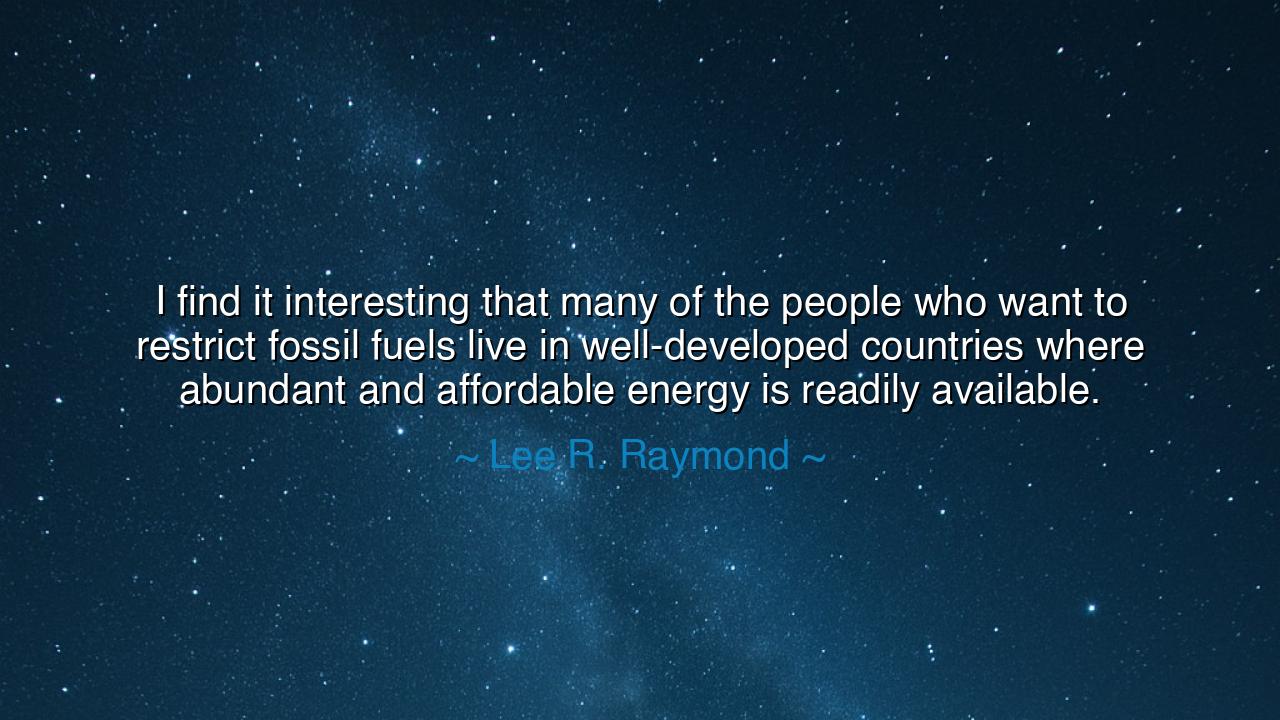
I find it interesting that many of the people who want to
I find it interesting that many of the people who want to restrict fossil fuels live in well-developed countries where abundant and affordable energy is readily available.






In the councils of old, the elders warned that it is easy to renounce what you no longer need. Lee R. Raymond’s provocation—“I find it interesting that many of the people who want to restrict fossil fuels live in well-developed countries where abundant and affordable energy is readily available.”—sounds that warning again. He points to a tension between moral urgency and material security: that voices calling for swift retreat from oil, gas, and coal often arise from places already lit, heated, and powered—where the consequences of scarcity are memories, not daily bread. The quote presses a hard question of fairness: who bears the cost of transition, and who speaks most loudly about it?
To hear the wisdom—and the sting—inside this line, separate its strands. First is the undeniable privilege of abundant and affordable energy: hot water at dawn, refrigeration through night, trains that keep their timetables, hospitals that do not flicker. Second is the claim that those who possess this security more readily demand that others forgo the very fuels that built it. The charge does not deny climate peril; it highlights equity—the ancient rule that burdens should be shared, not shifted, and that counsel given from comfort must be tested against the needs of those who still cook by smoke and study by candle.
Consider a parable from the last century. In the 1970s oil shocks, wealthy nations discovering the cost of scarcity learned the meaning of queues and cold rooms. Policy, technology, and thrift followed—efficiency standards, alternatives, new exploration. The lesson was double-edged: energy is the hidden skeleton of modern life, and its frailty is everyone’s frailty. Now imagine nations where that skeleton has never fully formed—where energy poverty means clinics without reliable cold chains and schools without light. For such places, a sudden command to abandon fossil fuels can feel like being told to leap a chasm without a bridge.
Yet history also offers a hopeful counter-parable. When a coastal country invested in distributed solar for clinics and micro-grids for villages, vaccines traveled safely, midwives worked after sunset, and small shops gained hours without diesel’s cost or fumes. Here, the path was not to preserve the old dependency, but to sequence the journey wisely: build new capacity first, then retire the dirtiest engines. The moral is not that transition must wait forever; it is that transition must be just—rooted in access, reliability, and dignity.
Raymond’s sentence, heard charitably, is a guardrail against unexamined zeal. It reminds reformers that policy announced in a bright capitol may land in a dim township; that a price on carbon without a plan for cooking fuel is a sermon without supper. Heard skeptically, the line risks becoming a stall—confusing the call for fairness with a license for delay. The elder way is to hold both truths: the planet’s fever demands speed, and peoples’ livelihoods demand care. Wisdom refuses the lazy extremes of either indifference or impatience.
From this tension, draw a clear lesson: bind climate action to energy access. Pledge the restricting of fossil fuels in lockstep with building clean, dependable alternatives—grids that reach the last mile, storage that rides through storms, stoves that spare lungs and forests, jobs that replace what is retired. Measure progress not only in gigatons avoided, but in blackouts prevented, clinics powered, and households freed from costly fuels. In this arithmetic, the transition ceases to be a tale of sacrifice told by the comfortable; it becomes a covenant of improvement shared by all.
Let counsel become action. For citizens in well-developed countries: pair advocacy with contribution—support financing that lowers the cost of clean power in emerging regions; reduce demand at home so global supply shocks ease. For leaders: design policies that move tons and lift lives—invest in transmission, storage, and clean cooking; retire coal in step with new capacity; protect workers with training and real bridges to new industries. For all: speak with humility, plan with sequencing, and judge success by both the environment we save and the people we serve. Do this, and the charge in Raymond’s words will be answered with a wiser boast: that we learned to change the fuel of civilization without dimming the lights of the poor.






AAdministratorAdministrator
Welcome, honored guests. Please leave a comment, we will respond soon